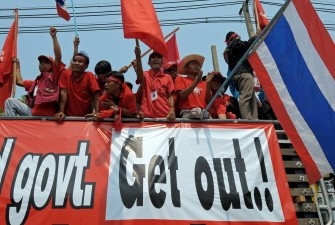BANGKOK, March 28, 2010 (AFP) - Thailand's embattled Prime Minister Abhisit Vejjajiva on Sunday began landmark talks with anti-government protesters, aimed at ending two weeks of street demonstrations.
The red-shirted demonstrators, who are calling for fresh elections, intensified pressure on Abhisit on the weekend, threatening to march in their tens of thousands on the military barracks where he has been been holed up.

Abhisit addressed the nation early Sunday to rule out being pressured into talks with the "Red Shirts" who support former leader Thaksin Shinawatra, but shortly after made an about-face and agreed to the meeting.
"The government's position is that we want to decrease conflict. We made a proposal and the protesters accepted -- it is a good sign, it is a good way out," said Satit Wongnongtoey, minister in the premier's office.
Satit sidestepped suggestions that the talks could not succeed because the protesters have only one demand -- the departure of an administration they criticise as elitist and undemocratic.
"We have never talked before. This is the first time, we cannot say how long the negotiations will last or what the outcome will be," he said.
Abhisit arrived at the venue, a Bangkok educational institute, along with two of his senior staff, and shook hands with his red-clad opponents as they sat down at the meeting table.
"This is not likely to take long because the atmosphere is good. Everyone is acting in good faith for the benefit of the country," said one of the three Reds representatives, Weng Tojirakarn.
However, another protest leader Nattawut Saikua said the movement was intent on removing Abhisit's administration which came to power in a 2008 vote, after Thaksin's allies were removed in a court ruling.
"We have one goal, the dissolution of the house," he said. "If the outcome is what we want, it means we have been successful in our demands. If not, we will have to discuss what to do next."
Thailand political analyst and Thaksin biographer Chris Baker said the talks would likely focus on the timing of polls which must be held by the end of 2011.
"I don't think these talks will be over so quickly. I think there will be the usual drama and theatre of these things. I wouldn't be surprised if we came out in the end with an election in November," he said.
The Reds are riding high after a rally Saturday that drew 80,000 people and forced troops to retreat from several security posts in the heart of the capital where they have been stationed since the demonstrations began.
The military has mounted a strong security operation involving 50,000 personnel for the demonstrations, which began on March 14 after a court ruling that seized 1.4 billion dollars of Thaksin's fortune.
The security measures, including a lockdown of parliament, which was surrounded by barricades and razor wire for a session this week, have been criticised as excessive.
Street demonstrations have passed off peacefully but the capital has been hit by an increasingly bloody series of explosions at government and army buildings.
A dozen people were injured over the weekend, including four soldiers wounded Sunday when grenades were lobbed at the gate of the barracks where Abhisit has been forced to live and work since the protests began.
Saturday saw three blasts, targeting two television stations run by the army and the government, and another on the customs department.
Thaksin, who was removed in a 2006 coup and lives in exile to avoid a jail sentence for corruption, addresses his supporters regularly by videolink and last week urged them to increase pressure on the government.
He also raised the prospect of a campaign of civil disobedience if Abhisit continues to reject demands to dissolve parliament.
























